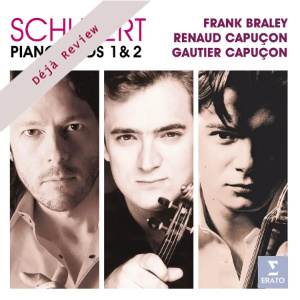
Déjà Review: this review was first published in June 2007 and the recording is still available.
Franz Schubert (1797-1828)
Piano Trio No.1 in B flat D.898 (1827)
Piano Trio No.2 in E flat D.929 (1827)
Notturno in E flat D.897 (1827)
Sonatensatz D.28 (1812)
Frank Braley (piano); Renaud Capuçon (violin); Gautier Capuçon (cello)
rec. 2006, MC2 Maison de la Culture de Grenoble, France
Originally reviewed as Virgin Classics release
Erato 3654762 [2 CDs: 99]
It’s not long ago I was being pretty dismissive of a Gemini budget reissue of these works (see review) from an earlier distinguished group of French musicians (Collard, Dumay, Lodéon), so it’s good to report a very different experience here. In fact, Braley and the Capuçon brothers have steadily been making waves in a number of areas: solo, concerto and chamber. This Schubert playing contains, quite simply, some of the most charming, poetic and exhilarating music-making I’ve heard in a while.
It’s been said often enough that getting the right tempo solves many musical problems. It may be simplistic, but there’s some truth in it, and these players seem to gauge each movement’s pulse and phrasing to perfection. I have to confess to liking bright, swift (ish) speeds for these works, but not accompanied by aggression or brashness – as above. Here, the bounce and lilt of the outer movements is perfectly contrasted by smooth, flowing inner movements. The imperious, forthright opening of the E flat recalls Beethoven and is indicative of the players’ general approach to the music. They are careful to observe in the famous march-like andante the additional marking con moto, and I think the balance of wistful nostalgia and forward momentum is just right. Braley’s sparkling finger-work in some of the trickier passages is a delight, as in the scherzo of the B flat, but there is such a feeling of true partnership and give-and-take between the three that criticism really is almost silenced. Though it hardly matters with playing of this quality, I have to mention that the fillers aren’t as generous as some rivals; mind you, I could easily live without the youthful Sonatensatz, whereas the Notturno is rather special, a raptly emotive little treasure that looks ahead to the poetic glories of the String Quintet, and is played here with a treasurable simplicity that eschews all sentimentality.
This is easily one of the best chamber discs to come my way for a while, and goes straight to the top for my recommendations of these wonderful works. Notes are adequate and audio quality excellent.
Tony Haywood
Buying this recording via a link below generates revenue for MWI, which helps the site remain free



















